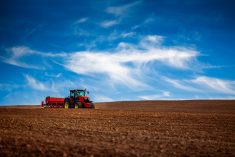Many young farmers dream of buying a farm. The question is: How can you turn that dream into reality?
The answer to that question raises more questions. Because there are several important considerations to think through very carefully before making that leap.
To start your farm-buying path off on the right foot, let’s look at some of the important issues you’ll need to consider.
Read Also

Five reasons why you avoid farm bookkeeping
Bookkeeping for the farm business might not be anyone’s favourite chore, but staying on top of it can help your farm access the funds it needs to grow.
The big decision
First, you will need to decide on the type of farm you wish to buy. The answer to this “big decision” question will both drive, and be driven by, all the considerations that follow. Ultimately, the type of farm you decide to purchase might not be the one you started out thinking about, but it’s important to trust the process.
The business plan
Once you have an idea of the type of farm you prefer, you will need to prove to your bankers that you can make the business work. To do this, you will need to create a business plan.
Simply put, you will not receive bank financing without a solid business plan.
Your business plan should include a well-researched and thought-out analysis of the market you intend to enter, reasonable estimates on the expected costs and revenues over a five-year period, financing required to buy and operate the farm (such as mortgages and lines of credit) and your repayment ability.
Every business plan should also include a SWOT (strength, weaknesses, opportunity and threats) analysis. Analyzing the internal and external factors that affect your business’s operation can better inform decisions and help establish your business strategy.
Consulting lawyers, accountants and business advisors early in the process is always a good idea.
Availability of land
An inevitable truth for Canadian farmers is that good quality farmland is hard to come by. Knowing how to locate farmland for sale is one of the most important steps toward buying your first farm.
Many farmland sellers are not farmers. They are landlords who often sell to the farmer currently renting their land. Connecting with those considering selling farmland now or in the near future is key to creating opportunities, both for your first and subsequent farm purchases. And starting your business by renting farmland could be a viable long-term option to gain access to farmland in the future.
Another option for locating available land for sale is through a real estate agent who specializes in selling farmland. If there is land for sale in your area, they will know!
Choosing the right farmland
Once you have located available land, you will need to figure out whether it’s right for you and your business. To make this decision consider the type of land your farm operation will require, water rights and grazing areas, municipal zoning, proximity to landfills and other potential hazards to your farm, windmill and solar panel leases that could affect the property, and any houses, barns or sheds located on the property.
Purchase costs
Once you have decided on a property to purchase, you will need to prepare for purchasing costs. Purchasing a farm property can include legal fees, land transfer tax (note that some land transfer tax exemptions are available to farmers and should be investigated), title insurance, Harmonized Sales Tax/Provincial Sales Tax on the purchase price, possible licences and permit fees (e.g., building permits, pesticide use permits, etc.), business insurance and mortgage fees.
Thankfully, one cost that purchasers can often avoid is real estate agent commissions. In many provinces, the seller’s realtor will generally enter into an agreement with the buyer’s realtor, and the commission payable to the buyer’s realtor will come from a share of the seller agent’s commission. If this is the case in your province there is little to no downside for you, the buyer, to engage the services of a real estate agent to help you locate available farmland.
Running the business
Finally, before you buy a farm, you need to know exactly how you are going to run your business. Starting a new farm means that you will need a plan for hiring workers, buying and maintaining equipment, buying and growing livestock and/or crops, efficient production strategies and a strong farm maintenance plan. You should also determine the need and budget for crop and/or farm consultants and veterinarians.
Start with the end in mind
While this article provides a foundation for the issues you will need to tackle when purchasing your first farm, the most important message is to plan ahead so that there are no surprises along the way. The best way to do that is to build your advisory team now. A top-tier group of advisors, who are willing to work together to further your goals, is the best way to ensure your first farm purchase is a success.
Todd Devitt is a lawyer with McKenzie Lake Lawyers located in London, Ont., with offices also in Guelph. Todd is an experienced business law lawyer with a focus on agri-business and succession planning. For more details, please view his biography at mckenzielake.com.















